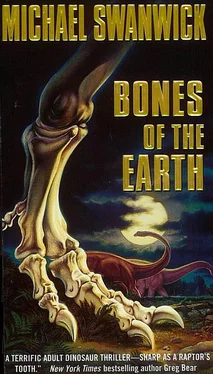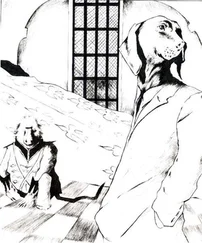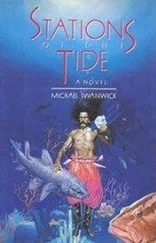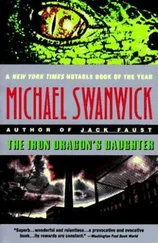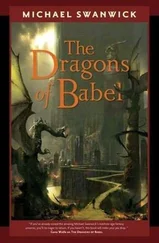The forest closed around them, and the shouted farewells of their friends faded away.
They walked.
For the first few hours they didn’t talk much, concentrating instead on making a good start. But the longer the silence lasted, the more time Leyster had to think. And the more he thought, the more he came up with speculations he wanted to know if the others shared.
Finally he said, “If tyrannosaurs and anatotitans do communicate with each other—and I’m not saying they do—what would they have to say to each other?”
“ ‘Surrender, Dorothy,’ ” Chuck said in a deep, rex-ish sort of voice. “ ‘I’ll get you and your little dog, too.’ ”
Tamara tried to choke back her laughter, and snorted instead. Then she said, “You remember last year, after the titanosaurs had eaten their way through the valley and were gone, how the Lord of the Valley stalked around the perimeter? And then, a couple of days later, the herds came pouring in?”
“Yeah?”
“Suppose he was staking out his territory, the way hawks do. He makes his claim to the valley and everything in it. Then maybe he’s actually calling the herds in. Telling them that the territory’s ready.”
“Why would they come, though?” asked Leyster, who’d been thinking along the same lines himself. “What’s in it for them?”
“A nice lush valley with plenty to eat, and a promise that if any other tyrannosaurs try to move in on them, the Lord will kick their butts. We’ve seen him drive away several bachelor rexes over the past year.”
“You’ve got to admit,” Chuck said. “It makes for an attractive package. Good food, good company, an absolute minimum of predation. If I were a hadro, I’d go for it in an instant.”
They were walking through a stretch of old-growth forest. The tree trunks were far apart from each other, and the floor was a soft and silent carpet of pine needles. They could talk quietly here, and without fear.
“As long as we’re speculating,” Tamara said, laying emphasis on that last word, “there could be any number of interspecific communication loops. Say the herds got too large for the carrying capacity of the valley, the rexes could split off smaller fragments of the herds and drive them away. We’ve seen behavior that looks very much like that.”
“How would they know to do that?” Leyster asked quickly.
“Infrasound again,” Tamara said. “If there’s too much of it around, too many trikes and titans gossiping back and forth, the rexes get irritable.”
“Only one thing can cure this headache,” Chuck said. “Scaring the crap out of a few herbivores.”
“Don’t forget,” Tamara said, “the behavior doesn’t have to be intentionally mediated. Ants engage in complex social behavior, and their brains are negligible, even by dinosaur standards.”
“Okay, but what’s in it for the tyrannosaur?”
“Easy prey. The herds are too large to keep together in tight, compact groups. They have to spread out to forage. Old Rexie can step in and bag one at his convenience.”
They were coming to the end of the old-growth forest. Ahead in the distance, the unvarying gloom brightened slightly, the diffuse effect of small shafts of light reaching through the canopy to the ground.
Leyster nodded. “I remember Dr. Salley gave a talk once in which she said that tyrannosaurs were farmers. I wonder if this is what she was talking about.”
“I was there too!” Chuck said. “You remember she said that mountains danced to the music of sauropods? I bet she was right about that one too.”
“Okay, now you’ve lost me.”
“Me too.”
“Hear me out. You know that continental drift isn’t silent, right? Those huge tectonic plates moving a couple of inches a year put out long, slow sound waves—infrasound. Now, if two oneirosaurs can hear each other a hundred miles apart, why can’t they hear the sound of the mountains moving and the plates shifting? And if they do, then there’s a mechanism for their migration. They can use those sounds to guide themselves into the interior and back again every year.
“But that’s not all! It would explain why all the non-avian dinosaurs died out at the K-T. There have been studies modeling the effects of the Chicxulub impactor and it would have struck the Earth like a gong! The infrasonic reverberations would have echoed back and forth for years.”
“So?” Tamara asked.
“So, during a time of enormous environmental stress, the major dinosaurs would have been deaf. Unable to migrate. Unable to communicate with each other. They, and everything reliant upon them, would have been at an incredible disadvantage. Imagine if ants suddenly lost the ability to cooperate socially! That’s where the dinosaurs would be.”
There was a moment’s silence. Then Tamara said, “Chuck, you’ve outdone yourself.”
“It’s inspired lunacy,” Leyster agreed. Chuck looked crestfallen. “Right up there with continental drift, or the notion that birds might be descended from dinosaurs.” Chuck brightened. “But it’s also right up there with Eric Van Danniken and Lamarckian genetics. Until we’ve tested it out, it’s just a nifty hypothesis, no more.”
“So let’s test it!”
“From here? I don’t see how. It hasn’t even happened yet. What kind of experiment could you…?” He lapsed into silence, considering the problem. If they could somehow jam the natural infrasonic emissions of the Earth, and then transmit a false signal, it would be possible to see if the migrating dinosaurs then went astray. But that would require equipment well beyond anything Lai-tsz could donkey together out of instrument chips and bailing wire. If they knew what part of the brain processed the infrasonics and then isolated it surgically—but that was as much a fantasy as the first notion. If they…
Leyster walked mechanically forward, spinning off idea after idea, until finally he came to the conclusion that the notion was untestable with the resources at hand. It was a problem they’d never be able to tackle, unless they were someday, against all odds, rescued.
He wondered if it was possible that they someday would go home again. It seemed unlikely. But not impossible. In which case, at that long-ago orientation lecture, Salley would have been simply feeding them their own speculations, repackaged as hers. He smiled sadly. That would be typical of her.
He looked up and saw that Tamara was staring at him. Chuck had taken over the lead, and was some twenty paces ahead of them. “I was just thinking about that lecture Dr. Salley gave,” he said.
“You’ve still got it for her, then?” she said quietly, so Chuck wouldn’t hear. He was not at all surprised by the ease with which she read deeper into his private thoughts than he himself had. She was a perceptive woman, and they, none of them, had a lot of secrets from one another anymore.
“No, that was just a notion I had once. I got over that one a long time ago.”
“Sure you did,” Tamara said. But affectionately. There was no sting in her words.
“Hey, look!” Chuck called. “There’s light ahead. A clearing!”
* * *
The clearing was filled with flowers, knee-high bushes, and a few musty-smelling sumacs. They were halfway across when they came too close to a toothbird nest. Chuck was in the lead, lustily singing “Waltzing Mathilda.” Leyster came second, and Tamara brought up the rear, spear in one hand and compass in the other.
Two birds burst out of the undergrowth.
Screaming, the male—they could tell by the bright orange slashes on its wings—dove at Tamara’s head. She flinched away, futilely slashing her spear in the air. It banked tightly, and dove at Chuck.
Meanwhile, the female ran straight at Leyster, wings out and claws extended. It climbed right up his pants and shirt. It happened so fast that the bird’s sharp-toothed beak was snapping at his face before he had time to react.
Читать дальше
